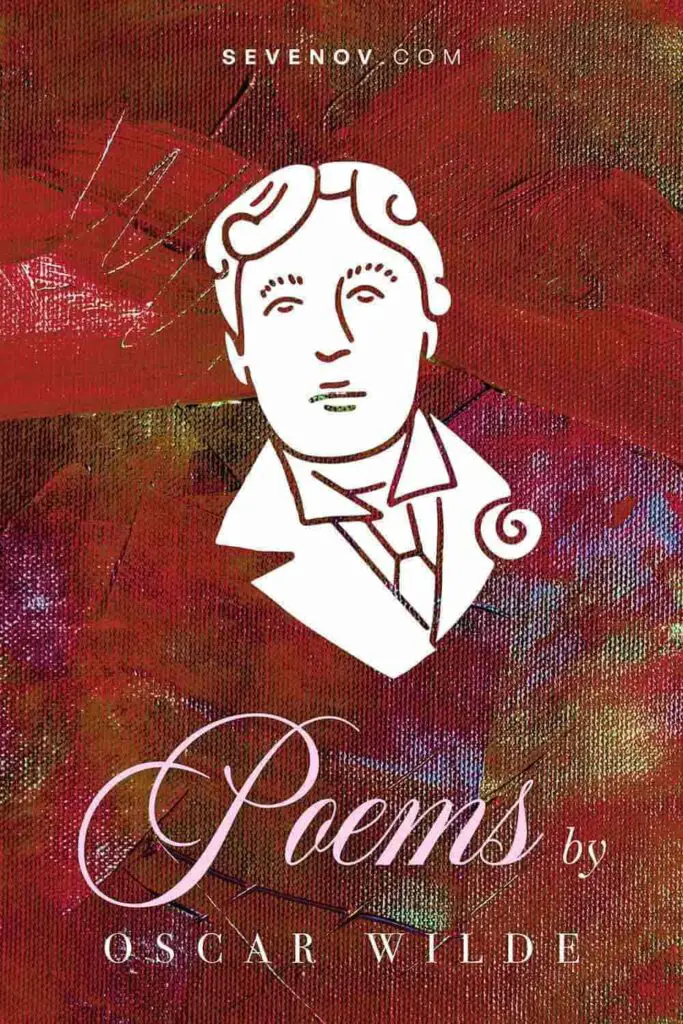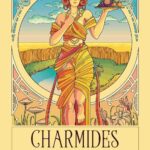Poems by Oscar Wilde

Author: Oscar Wilde
Published: 1911
Genre: Poetry
Published posthumously in 1911, Poems by Oscar Wilde offers a deep and intimate look into the mind of one of the 19th century’s most enigmatic literary figures. Alongside the complete volume of Poems published in 1881, the anthology presents masterpieces such as “The Sphinx,” a hauntingly beautiful exploration of love and desire; “The Ballad of Reading Gaol,” a poignant reflection on his time in prison and the human condition; and “Ravenna,” a lyrical tribute to the ancient Italian city. Through these verses, readers are invited to journey into Oscar Wilde‘s multifaceted world, one filled with profound insights, passionate emotions, and the undying spirit of a true artist.
1. Poems by Oscar Wilde Summary
Below are some poems from Poems by Oscar Wilde:
1.1. Hélas!
The speaker reflects on his life, feeling that he has been swayed by every fleeting emotion and has thus sacrificed his wisdom and self-discipline. He likens his life to a scroll that has been overwritten with trivial songs, obscuring its original meaning. He believes there was a moment when he could have achieved greatness and touched the divine, but questions whether he has lost that opportunity, merely having tasted the sweetness of romance and potentially losing something much greater.
1.2. Sonnet To Liberty
The speaker does not hold affection for the children of democracy who are self-absorbed in their own sorrows. However, the tumultuous nature of democracies and their revolutionary spirit resonate with the speaker’s own intense emotions. The speaker finds joy in the clamor for liberty. While the speaker might remain indifferent to the oppressive actions of kings, there’s a deep sympathy for those who sacrifice their lives fighting for their rights on the frontlines.
1.3. Libertatis Sacra Fames
The speaker acknowledges being raised in a democratic environment and appreciating a republican state where everyone is equal. However, he expresses a preference for the rule of one authoritative figure rather than being led astray by deceptive demagogues promoting chaos. He has a strong distaste for those who disrespectfully advocate for rebellion without just cause, as under such leadership, important values like arts, culture, and honor diminish, leaving only treachery and violence.
1.4. The Garden of Eros
The poem is a reflection on beauty, nature, love, and the passing of time, interwoven with references to classical myths and legends. The speaker laments the changing world, where modernity and science threaten to overshadow the beauty and mystery of the natural world and classical legends. The speaker makes several references to characters and scenes from mythology, emphasizing the eternal value of beauty and nature. Despite the advances of the “scientific age”, the speaker asserts the undying significance of emotions, beauty, and the mysteries of the universe. The poem ends with a transition to night as day wanes, suggesting the cyclical nature of time and perhaps the inevitability of change.
1.5. Requiescat
The poem describes a woman who has passed away, buried under the snow. Her once golden hair has now tarnished, and she, who once was young and beautiful, has turned to dust. She grew up so innocently that she hardly realized her womanhood. Despite the weight of the coffin and stone on her, the speaker laments alone, emphasizing that she is at peace and cannot hear any songs or poems.
1.6. Sonnet on approaching Italy
The speaker describes arriving at the Alps and feeling a deep passion upon thinking of Italy. Emerging from the mountains and seeing the longed-for land, he felt triumphant. He admired the beautiful scenery, comparing pine trees to a woman’s waving hair and orchards to blossoming foam. However, upon remembering that someone significant (referred to as a “second Peter”) was in distress in Rome, the speaker’s joy turned to sorrow despite the beauty surrounding them.
1.7. Easter Day
The poem describes the grandeur of the Pope’s procession in Rome, with the sound of silver trumpets and the reverence of the people. The Pope is depicted in majestic attire with three golden crowns. This opulent scene contrasts sharply with the poem’s end, where the speaker recalls a lone figure from the past, wandering by the sea, seeking rest but finding none. The speaker, in sharp contrast to the Pope’s splendor, has no place to call home and faces hardships, symbolized by bruised feet and tears mixed with wine.
1.8. Madonna Mia
A delicate lily-girl appears untouched by worldly pain, with brown hair, dreamy eyes, and pale cheeks untouched by love. Her lips and throat exhibit contrasting hues of life and purity. Although the speaker is in constant admiration, he feels too humbled to even kiss her feet, reminiscent of Dante’s reverence for Beatrice when witnessing divine wonders.
1.9. The New Helen
The poem speaks to a timeless, ethereal figure, Helen, referencing her legendary beauty and the chaos and wars it incited, specifically the Trojan War. The narrator questions where she has been, alluding to various mythological and historical references. There are mentions of her divine birth from the sea, suggesting her immortal and otherworldly nature. The poem touches on themes of love, beauty, pain, and the overwhelming power of Helen’s presence. Throughout, there’s a palpable sense of adoration, desperation, and reverence toward Helen, with the speaker expressing a deep desire to remain in her radiant presence, away from the darkness and pain of existence.
1.10. The Burden of Itys
In this poem, the speaker reflects on the natural beauty of the English countryside, contrasting it with the religious and mythological imagery associated with other places like Rome. The poem expresses a desire to embrace life and joy while acknowledging the presence of sorrow and memories. The speaker hears the song of a bird and is moved by the beauty of the landscape, ultimately deciding to return to town when the curfew rings from Christ Church gate.
1.11. Impression du Matin
The Thames transitions from a blue and gold nocturne to a grey harmony. A barge carrying hay departs, and a cold yellow fog envelops the city, making buildings appear shadowy and causing St. Paul’s to seem like a bubble. As life awakens, streets bustle with waggons and a bird sings atop a roof. Amidst it all, a lone pale woman with fiery lips and a cold heart lingers under the gaslight.
1.12. Charmides
Charmides, a Grecian youth, returns home and is lured by a shining spear to a temple. There, he falls for a mysterious figure who is revealed to be the disguised goddess Athena. Despite warnings, he succumbs to forbidden love, leading to his tragic end in the sea. His body is retrieved by a Triton-god and brought to the Grecian coast, where mermaids beautify him. As he’s taken to a magical meadow, a dryad, unaware he’s deceased, yearns for his love. Her hope turns to desperation as a looming threat approaches. In the afterlife, in the realm of Acheron, Charmides is approached by an enigmatic presence and they share a passionate moment. Find out more about Charmides.
1.13. Theocritus: A Villanelle
The poem speaks to the “Singer of Persephone” and revisits various scenes and characters associated with Sicily. It repeatedly asks the singer if shr remembers Sicily, invoking memories of Amaryllis, Simætha, and her call to Hecate, Polypheme by the sea, the rivalry of young Daphnis, and the offerings of Slim Lacon. The recurring refrain underscores a deep sense of nostalgia and longing for the remembered land.
1.14. Her Voice
A bee moves from flower to flower, symbolizing the fleeting nature of moments. The speaker recalls a vow made with a loved one, swearing eternal unity. But time has passed, and their promises are over, hinting at a change in their relationship. The environment around them, including poplar trees, the sea, and gulls, evokes feelings of nostalgia and introspection. The speaker contemplates the possibility that they might have lived in a dream-like state, feeling a sense of sadness. Despite the changes, the underlying message is that love remains enduring. The poem concludes with the acceptance of inevitable parting, with each retaining their unique qualities, emphasizing that one world wasn’t sufficient for their individualistic spirits.
2. Conclusion
If you’re captivated by the poetic genius of Oscar Wilde, we’re delighted to share that Poems by Oscar Wilde is available online. Dive deeper into his mesmerizing verses and explore the breadth of his work.




